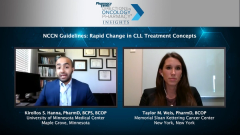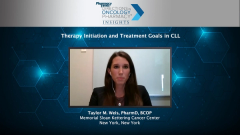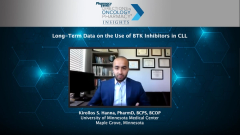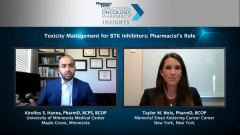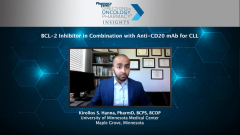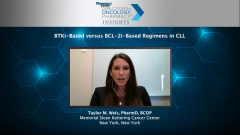
BTK Inhibitor in Combination With Anti-CD20 mAb for CLL
Taylor M. Weis, PharmD, BCOP, discusses data on a BTK inhibitor in combination with anti-CD20 monoclonal antibodies in the treatment of CLL.
Episodes in this series

Kirollos S. Hanna, PharmD, BCPS, BCOP: When you’re picking BTK [Bruton tyrosine kinase] therapies, what has your experience been in terms of picking BTK monotherapy or combining it with an anti-CD20 [monoclonal antibody]? We know there are some trials looking at this, such as the Alliance trial, E1912, Elevate TN trial, whether they’re looking at ibrutinib or acalabrutinib, plus or minus various anti-CD20s, such as rituximab or obinutuzumab. What have we been seeing from there, and is there a certain approach we need to take when we’re selecting treatment, monotherapy or combination?
Taylor M. Weis, PharmD, BCOP: Great question, and as I mentioned before, the NCCN [National Comprehensive Cancer Network] guidelines interestingly stick with ibrutinib monotherapy as a recommended frontline therapy, or acalabrutinib plus or minus obinutuzumab, and this can be confusing for some providers and patients. Why do we need a CD20 antibody with acalabrutinib and not with ibrutinib? The reason it is this way in the guidelines is based upon randomized controlled trials undertaken that have compared ibrutinib monotherapy to ibrutinib plus rituximab. One of them was a phase 3 study by Jennifer Woyach, [MD,] and colleagues that was published in the New England Journal of Medicine in 2018. They compared ibrutinib alone, ibrutinib and plus rituximab versus bendamustine and rituximab as first-line treatment in an older patient population, and they didn’t show that the combination of ibrutinib with rituximab had any benefit in terms of response rate, progression-free survival, or overall survival versus ibrutinib monotherapy.
Unfortunately, we don’t have any randomized controlled trials comparing ibrutinib alone versus ibrutinib plus obinutuzumab, which is a more potent second-generation CD20 antibody. Thus, at this time, we really don’t have any data to show that CD20 antibodies may have any benefit, with the exception of a recent study. The phase 3 GENUINE study that was published compared ibrutinib monotherapy to ibrutinib plus ublituximab. This is an investigational next-generation CD20 monoclonal antibody, and this was in a relapsed/refractory patient population with high-risk features, where they did report preliminary results with increased overall response rates. However, for this population overall response rate is not really a good surrogate end point. Unfortunately, due to slow accrual they weren’t able to look at progression-free survival as a primary end point, and that’s why we don’t have this FDA-approved combination at this time.
However, for acalabrutinib in the phase 3 ELEVATE-TN study, we did see in a 4-year follow-up that the combination of acalabrutinib plus obinutuzumab had a small but significant increase in progression-free survival with the combination. We saw 87% 4-year progression-free survival with the combination versus 78% alone, suggesting that it may provide a deeper remission for some patients. This comes up as a question in the clinic, when we’re starting a patient on acalabrutinib, do we need to add obinutuzumab? Sometimes we favor this in a younger patient with high-risk features for whom we want to have a deep long remission, although with the follow-up data at this time, we don’t know if this correlates with any long-term benefits.
Transcript edited for clarity.
Newsletter
Stay informed on drug updates, treatment guidelines, and pharmacy practice trends—subscribe to Pharmacy Times for weekly clinical insights.

